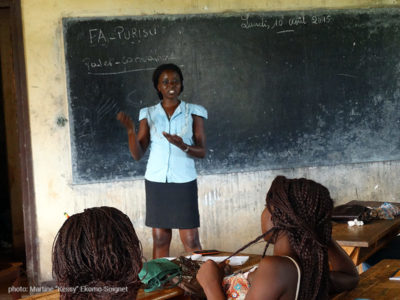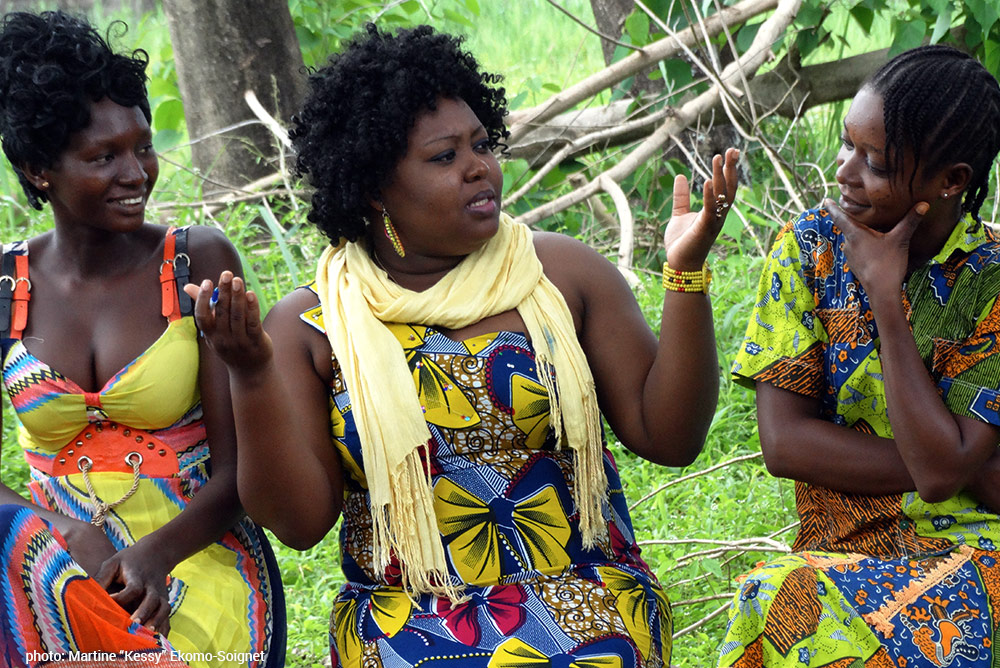My country, the Central African Republic, faced several crises which had a negative impact on the educational system. The country is suffering from unacceptably high pupil-teacher ratios, poorly trained teachers, insufficient textbooks and poor infrastructure (mainly destroyed during conflicts). The coffers of the state are empty and the budget allocated to the education system is not enough to support the recovery of the sector.
We are trying, with the limited resources we have and international support, to get our children back to school but the curriculum does not match the realities of the country and evolution of the world anymore. It’s not difficult to meet children or youth going to school who no longer believe in the benefit of education, due to their lack of perspective and opportunities.
When I was 6 years old, I remember having a conversation with my mother about what I would like to do as an adult. My dream was to be a lawyer for children or to work for the United Nations. “Big dreams for a 6 year-old girl,” people said.
Today, I’m not a lawyer or formally working for the United Nations, but I’m still dreaming big and trying to make a great impact on the world around me. When I tried to understand the factors which motivated me to dream so big at such a young age, I realized that the role models I had around me (in school and out of school) played an important role in inspiring my ambition for the future. Education built my capacity and helped me discover my leadership potential.
In the work my organization URU (meaning “take off” in English) is doing with girls today, I’m using lessons learned from my own experiences as a guide. Our girl’s empowerment program, YWALI, aims to provide leadership and entrepreneurship training to school girls during holiday periods. During all the trainings, our girls interact with women and men who demonstrate leadership and have powerful personal stories about how education shaped the person they are today. Session after session, we see positive changes coming from our girls as demonstrated in their speech, their behaviors and above all, their marks at school.
If the core of the education problem is the need to raise funds to support the provision of basic education for all, one of the big challenges, in countries such as mine, is to make children and youth believe in education again as a path towards a better future and a way to be part of something bigger for their country.
To do so, governments, local leaders (youth, women and men) and the private sector have an important role to play by introducing role models in the school system and in places where children and youth spend time.
Based on my own personal and professional experiences, I deeply believe that this kind of partnership will:
- Open spaces to non-formal education initiatives which will have a great impact on the education system
- Help engage the private sector to support provision of basic education
- Engage governments in their role as policymakers
Serving as a member of the Education Commission’s Youth Panel is a great honor for me. The Commission’s three main objectives align with the story I have shared here:
- Bring together the best evidence from around the globe on what works to expand and improve learning
- Agree on an investment case and agenda for action
- Inspire and persuade leaders – at all levels and sectors – to action!

Martine “Kessy” Ekomo-Soignet
Martine “Kessy” Ekomo-Soignet is a member of the Education Commission’s Youth Panel. You can read more about her work here.


Thanks Kessy for sharing your story. I already knew about what URU does for peace in CAR, but great to learn about your education work as well!
Bonjour,
J’apprécie le punch de cette jeune personne. Je me suis sentie transportée par son article. Pour connaître l’environnement dans lequel elle a vécu, je suis de celles qui pensent en effet que, la jeunesse a besoin de modèles pour se construire une vision d’un avenir meilleur. Car tout part d’abord de la vision. Or les crises à répétitions dans notre pays ont annihilé la possibilité de rêver !!! Le rêve, que dis-je, le cauchemar est le quotidien de notre jeunesse et quand certaines échappatoires leur permettent enfin de rêver, elle ne peut réaliser ses rêves. Il en résulte des frustrations dont l’expression est souvent morbide. Aussi, le prolongement du projet de nos filles serait de conduire quelques jeunes jusqu’à l’accomplissement de leurs rêves : rêves de formation, rêves de se bâtir un emploi individuel, …Mais je vois aussi l’accomplissement de rêves dans l’environnement immédiat : refaire la maison de mes parents avec l’aide de la communauté des jeunes de mon quartier, etc…
Il n’y a pas de limites dans les rêves mais probablement une carence en leaders capables de transformer les jeunes en un puissant carburant de notre société par l’accomplissement de leurs rêves. A l’instar d’une chanson de Whitney Houston, “I believe the children (youth)are our futur…”.
Longue vie à YWALI, pour l’éveil des jeunes filles centrafricaines.
GISELE BEDAN-Ancienne Ministre de l’Education,/Ancienne Conseillère Education Jeunesse de la Présidente de la Transition en Centrafrique.
Nous n’avons que notre jeunesse et les enfants pour un monde de demain plus meilleur.